What to know
These tables and figures provide supplemental information not published in Surveillance for harmful algal bloom events and associated human and animal Illnesses—One Health Harmful Algal Bloom System, United States, 2016-2018 (MMWR Weekly).
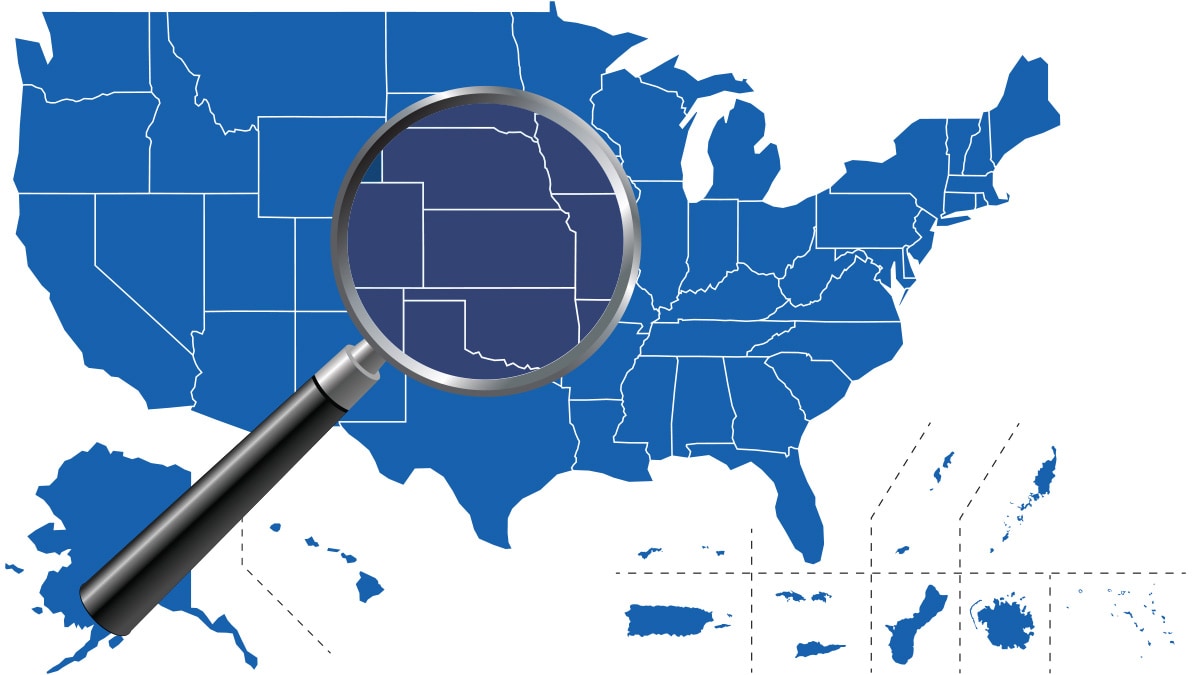
OHHABS development
OHHABS Working Group
State and federal partners in the OHHABS (One Health Harmful Algal Blooms) Working Group from 2014 to 2016 informed development of the reporting system. State partners included Arizona, Florida, Illinois, Indiana, Iowa, Kansas, Maryland, Massachusetts, Michigan, Minnesota, New York, Ohio, Oregon, South Carolina, Virginia, Washington, and Wisconsin. Federal partners included the Agency for Toxic Substances and Disease Registry, National Oceanic and Atmospheric Administration, National Park Service, U.S. Environmental Protection Agency, U.S. Food and Drug Administration, and United States Geological Survey, with support from the Great Lakes Restoration Initiative.
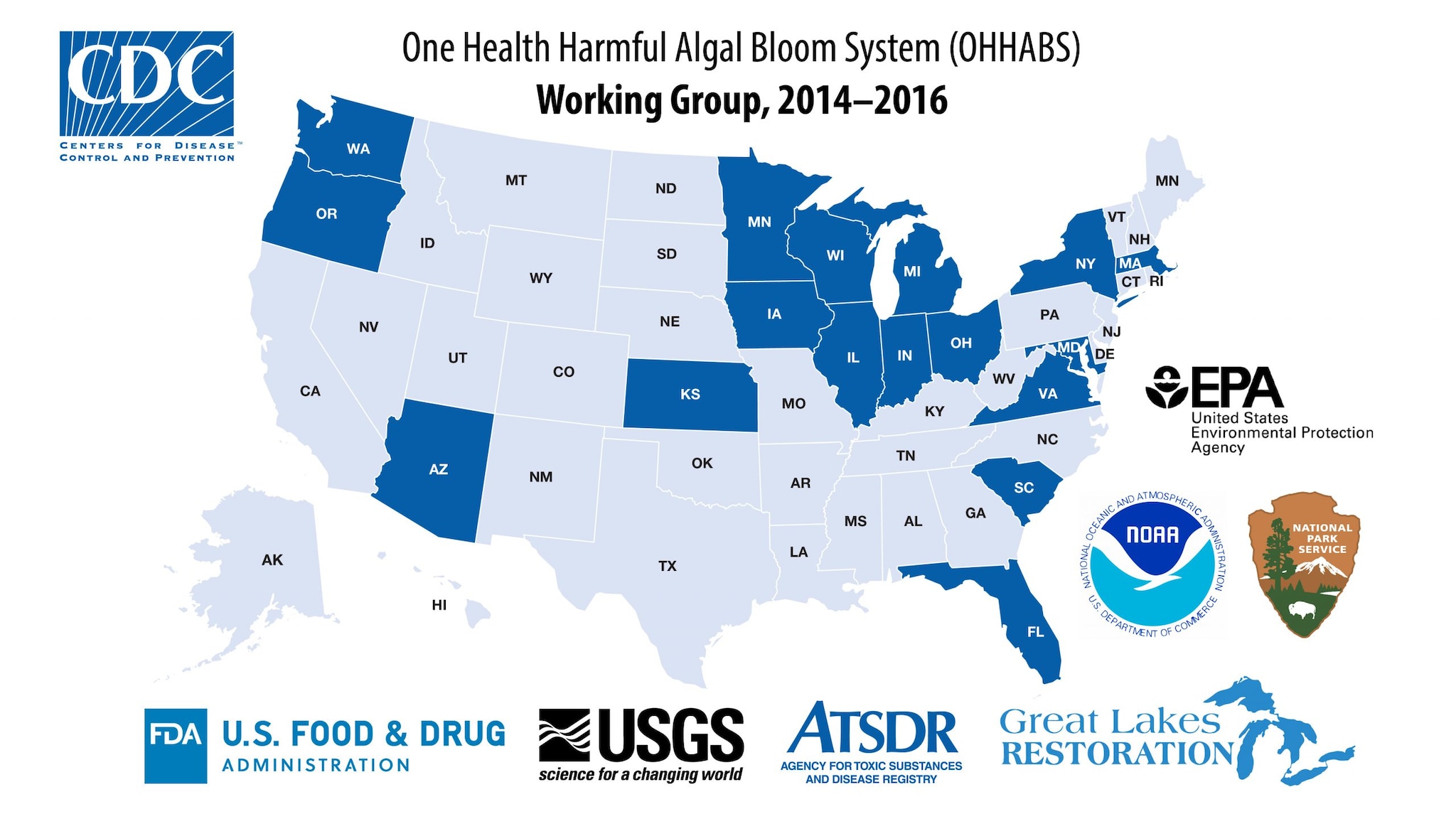
OHHABS development timeline
CDC and its partners initiated the development of the system in 2014, and it was nationally launched in 2016. The OHHABS Working Group was established in January 2014, and IT development commenced in March of the same year. By May 2015, CDC had finalized the definitions used to classify harmful algal bloom (HAB) events and associated cases of illness in OHHABS. Following a pilot in August 2015, the system was officially launched in June 2016.
HAB events and cases
States reporting HAB events
A total of 18 states adopted OHHABS and voluntarily reported 421 HAB events during 2016–2018: Alaska, Arizona, California, Connecticut, Florida, Kansas, Maryland, Michigan, Minnesota, Nevada, New York, North Carolina, Ohio, Oregon, Pennsylvania, Utah, Virginia, Wisconsin.
Thirteen states reported human cases, animal cases, or both: Alaska, California, Florida, Kansas, Michigan, Minnesota, New York, Ohio, Oregon, Pennsylvania, Utah, Virginia, Wisconsin.
Ten states reported human cases: Alaska, California, Kansas, Minnesota, New York, Ohio, Oregon, Pennsylvania, Utah, Wisconsin.
Ten state reported animal cases: California, Florida, Kansas, Michigan, Minnesota, New York, Oregon, Utah, Virginia, Wisconsin.
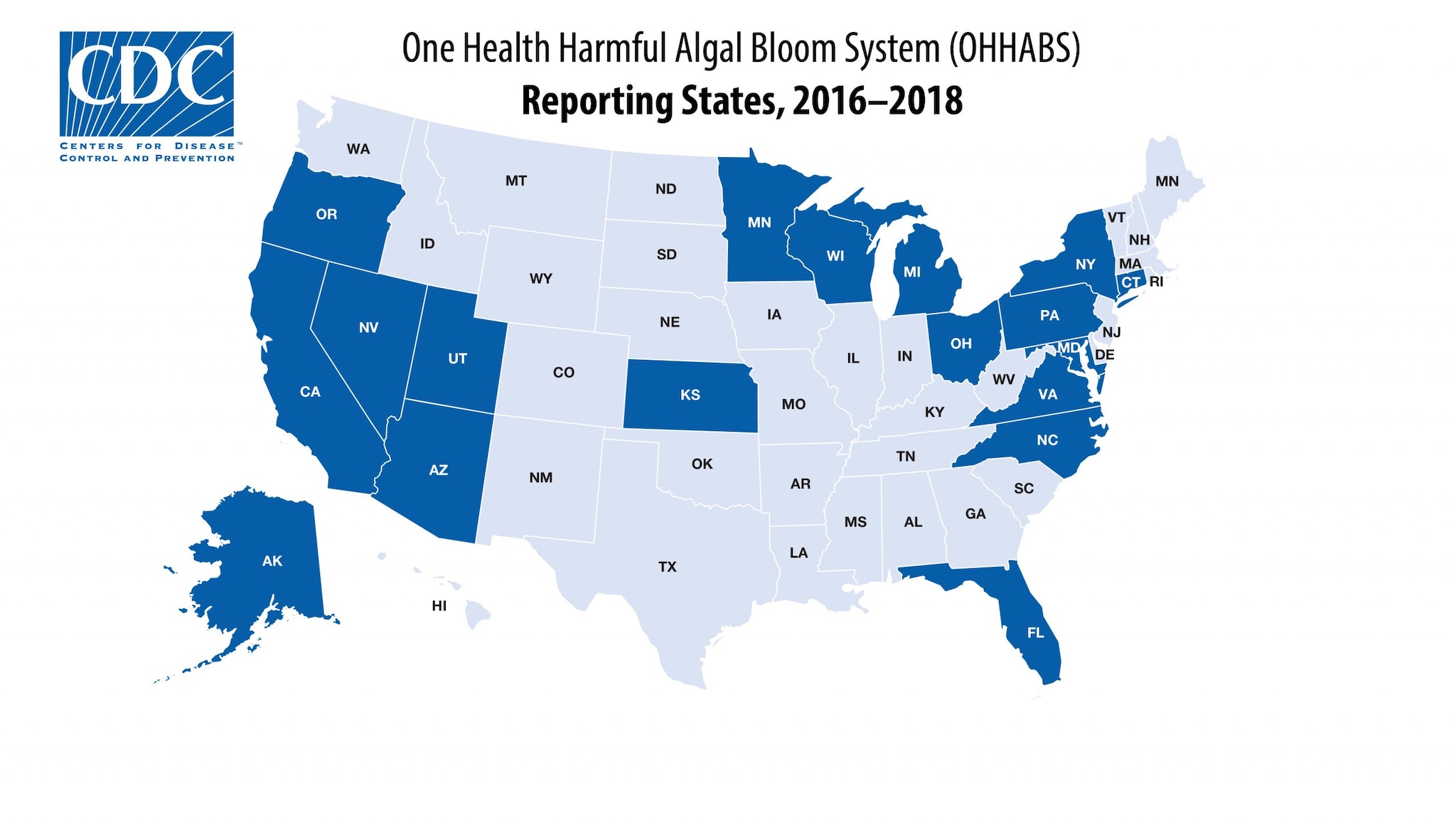
Reported HAB events with associated human and animal cases
States submitted 421 HAB event reports into OHHABS for 2016–2018, including 312 HAB events that did not have any associated cases. There were 73 HAB events with associated human cases, 42 with associated animal cases, and 6 with associated human and animal cases. There were 389 cases of human illnesses and at least 413 cases of animal illnesses associated with reported HAB events. The cases of animal illness were reported as 55 single cases of illness, as well as nine groups of illness. The nine groups accounted for at least 358 animal illnesses.
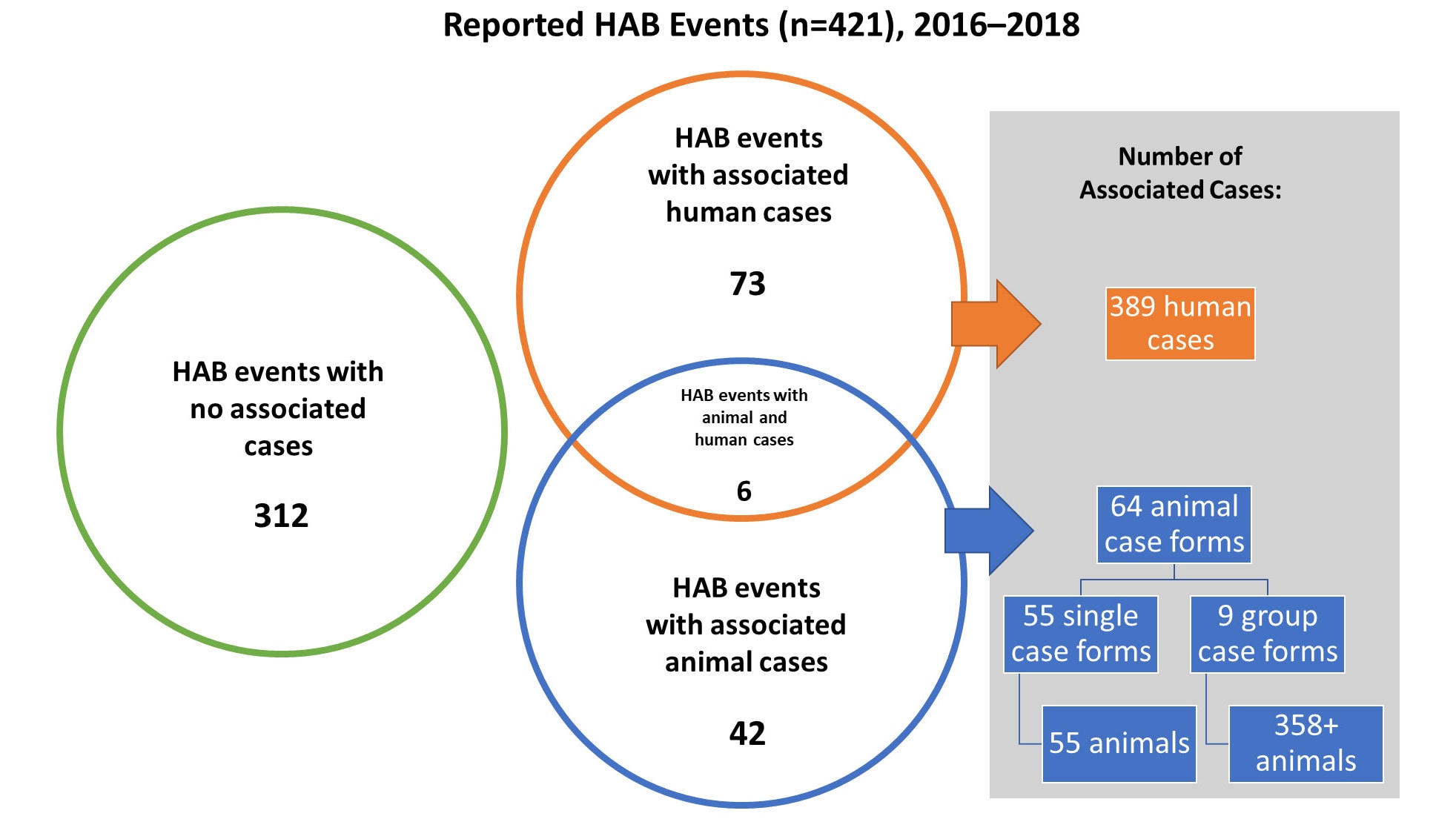
Download the data: Reported HAB events with associated human and animal cases [XLS – 15 KB]
Reported HAB events and cases by month, 2016-2018
Two separate HAB events produced peaks of human and animal cases, as seen in this figure. During July 2016, a large HAB event resulted in 199 human cases, and in May 2018 a large HAB event caused a die-off of 300 birds.
HAB event month was assigned based on available data, using the following hierarchy: 1) bloom observation date, 2) month of bloom notification, 3) earliest date of an associated human or animal case.
Human case month is the reported illness onset date. Animal cases were assigned months based on available data, using the following hierarchy: 1) illness onset date, 2) discovery date, 3) death date.
Download the data: Reported HAB event and case occurrence by month, 2016-2018 [XLS – 15 KB]
Animal cases reported to OHHABS by month 2016-2018
In May 2018, a bloom event resulted in a large bird die-off of 300 birds. Animal cases were assigned months based on available data, using the following hierarchy: 1) illness onset date, 2) discovery date, 3) death date.
Download the data: Reported HAB-associated animal case occurrence by month, 2016-2018 [XLS – 15 KB]
Classification of reported HAB events and associated cases, 2016-2018
HAB events could be classified as either suspected or confirmed; HAB-associated cases of illness could be classified as either suspected, probable, or confirmed. The majority (88%) of the 421 reported HAB events were confirmed. The majority (88%) of the 389 reported human cases were probable. The majority (81%) of 413 reported animal cases were suspected. Case classification criteria are provided in the HAB event and case definitions [PDF – 3 pages].
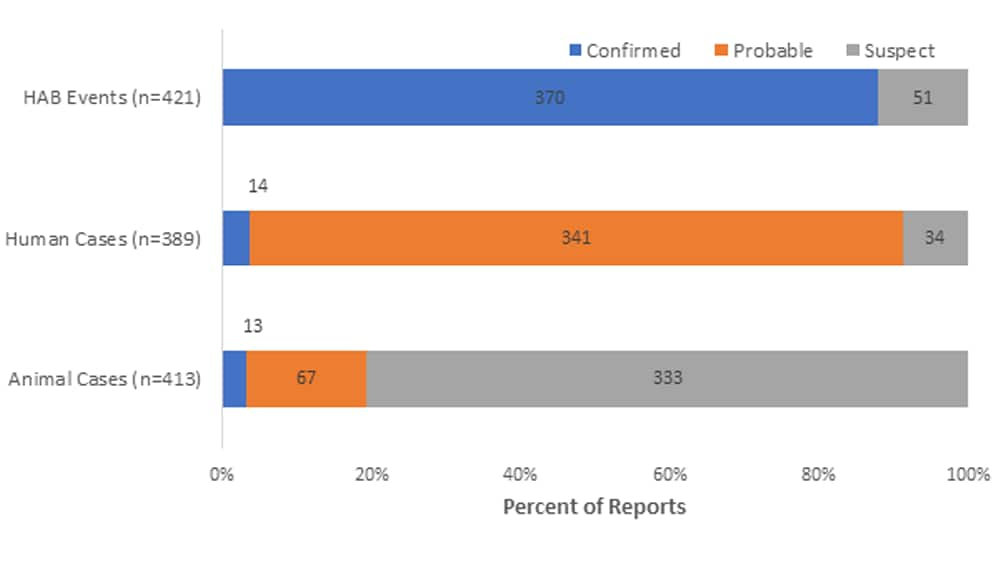
Download the data: Classification of reported HAB events and cases, 2016-2018 [XLS – 16 KB]
Classification of reported HAB-associated animal cases, by type, 2016-2018
HAB-associated animal cases of illness could be classified as either suspected, probable, or confirmed. The majority (99%) of 319 reported wildlife cases were suspected. The majority (60%) of the 52 reported domestic pet cases were probable. The majority (81%) of the 42 reported livestock cases were probable. Case classification criteria are located in the HAB event and case definitions [PDF – 3 pages].
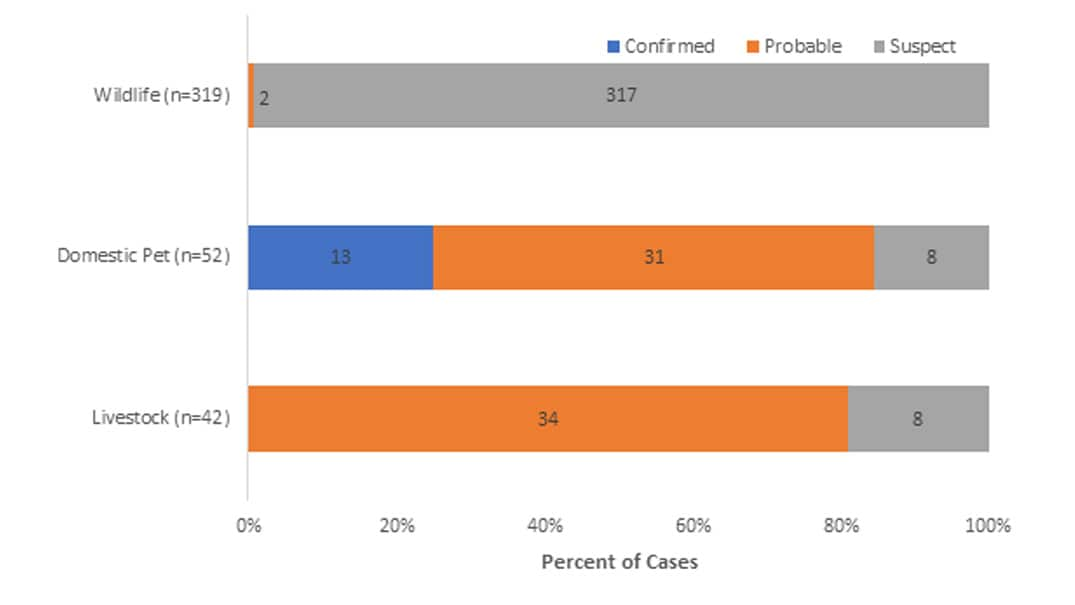
Download the data: Classification of animal cases by type, 2016-2018 [XLS – 16 KB]
Human signs and symptoms
Reported signs and symptoms in 389 human cases of HAB-associated illness during 2016–2018 were classified primarily based on the organ system affected. "Generalized" refers to constitutional signs and symptoms such as headache, fever, or lethargy. Some signs and symptoms classified as neurologic may present in other systems (e.g., ophthalmologic). Gastrointestinal, generalized, and dermatologic were the most frequently reported categories.
Human Signs and Symptoms (n=389 cases)*
n (%)§
Cardiopulmonary
41 (11)
Cough
18 (5)
Dyspnea (shortness of breath)
16 (4)
Difficulty breathing
8 (2)
Chest tightness
4 (1)
Chest pain
3 (1)
Respiratory symptoms (nonspecific)
3 (1)
Respiratory irritation
1 (<1)
Wheezing
1 (<1)
Tachycardia (rapid heartbeat)
1 (<1)
Dermatologic
104 (27)
Rash
57 (15)
Pruritus (itchy skin)
32 (8)
Erythema (redness)
8 (2)
Irritated skin
8 (2)
Skin burning/pain
7 (2)
Infected wound
4 (1)
Skin blisters
3 (1)
Itchy welts
3 (1)
Bullous skin lesions (fluid filled blisters)
2 (1)
Skin infection
1 (<1)
Urticaria (hives)
1 (<1)
Ear/Nose/Throat
62 (16)
Throat, sore or pain
29 (7)
Nasal, congestion (rhinitis)
19 (5)
Throat, irritation
12 (3)
Nasal, coryza (runny nose)
9 (2)
Ears, ache or pain
4 (1)
Sneezing
4 (1)
Oral, sores
3 (1)
Oral, numbness
1(<1)
Oral, swelling
1(<1)
Tongue, swollen
1(<1)
Nasal inflammation
1(<1)
Dysphasia (difficulty swallowing)
1(<1)
Gastrointestinal
262 (69)
Diarrhea
153 (39)
Nausea
139 (36)
Vomiting¶
116 (30)
Abdominal pain (tenderness)
75 (19)
Abdominal cramps
27 (7)
Bloody stools
4 (1)
Gas/bloating
3 (1)
Generalized
169 (43)
Headache
105 (27)
Fever
51 (13)
Fatigue
29 (7)
Anorexia (loss of appetite)
16 (4)
Lethargy (lack of energy, tiredness)
16 (4)
Chills
13 (3)
Pain (general)
10 (3)
Body ache
8 (2)
Malaise (general discomfort)
7 (2)
Night sweats
5 (1)
Faintness (lightheadedness)
3 (1)
Pallor
2 (1)
Hot flash(es)
2 (1)
Flushing (face or body)
1(<1)
Sweating
1(<1)
Flu-like symptoms
1(<1)
Genitourinary
6 (2)
Dysuria (pain with urination)
3 (1)
Dark urine
2 (1)
Hematuria (blood in urine)
1(<1)
Musculoskeletal
13 (3)
Muscle pain
10 (3)
Arthralgia (joint pain)
5 (1)
Muscle fatigue
2 (1)
Backache
1(<1)
Muscle cramps
1(<1)
Neurologic
56 (14)
Dizziness
34 (9)
Paresthesia (tingling sensation)
17 (4)
Weakness
15 (4)
Ataxia (loss of coordination)
5 (1)
Temperature reversal (hot-cold reversal)
5 (1)
Confusion
3 (1)
Neurological symptoms (nonspecific)
2 (1)
Seizures
1(<1)
Ascending paralysis
1(<1)
Ophthalmologic
30 (8)
Eye irritation
14 (4)
Blurred vision
5 (1)
Eye burning
4 (1)
Conjunctivitis (pinkeye)
4 (1)
Periorbital edema (swelling)
3 (1)
Eye pain
3 (1)
Eye redness
2 (1)
Watery eyes
1(<1)
Eye symptoms (nonspecific)
1(<1)
Other
30 (8)
Other
28 (7)
Dry mouth
1(<1)
Anaphylaxis
1(<1)
Unknown
9 (2)
∗ 67% of cases still experienced symptoms at the time of interview.
§ Percentages may exceed 100% because multiple options could be selected.
¶ Includes one report of hematemesis (bloody vomitus).
Download the data: Human HAB-associated illnesses signs and symptoms [XLS – 20 KB]
Animal signs
Reported signs in 92 animal cases of HAB-associated illness during 2016–2018 were classified primarily based on the organ system affected. "Generalized" refers to constitutional signs such as weakness, lethargy, or anorexia. Some signs classified as neurologic may present in other systems (e.g., ophthalmologic).
Animal Signs*
n (%)§
Cardiopulmonary
7 (8)
Shock
1 (1)
Hypotension
1 (1)
Labored breathing
1 (1)
Wheezing
1 (1)
Cyanosis/pale mucous membrane
1 (1)
Respiratory arrest
1 (1)
Dermatologic
2 (2)
Itching
2 (2)
Ear/Nose/Throat
1 (1)
Ear irritation
1 (1)
Gastrointestinal
50 (54)
Diarrhea
26 (28)
Vomiting
24 (26)
Liver failure
2 (2)
Painful abdomen (on palpitation)
1 (1)
Jaundice
1 (1)
Tucked abdomen (arched back)
1 (1)
Generalized
59 (64)
Lethargy
15 (16)
Anorexia (loss of appetite)
10 (11)
Weakness
6 (7)
Collapse (unable to stand)
4 (4)
Dehydration (refusing water)
2 (2)
Stumbling
1 (1)
Whining or abnormal vocalization
1 (1)
Hematologic
1 (1)
Unexplained bleeding
1 (1)
Neurologic
13 (14)
Seizure/Convulsions
6 (7)
Ataxia (stumbling, loss of balance)
3 (3)
Behavior change
2 (2)
Paralysis
2 (2)
Opisthotonos (severe hyperextension)
1 (1)
Stupor (decreased consciousness, unresponsiveness)
1 (1)
Other
3 (3)
Other
3 (3)
∗ Summarized for the subset of reports with data available.
§ Percentages may exceed 100% because multiple options could be selected.
Download the data: Animal HAB-associated illnesses signs [XLS - 19 KB]
